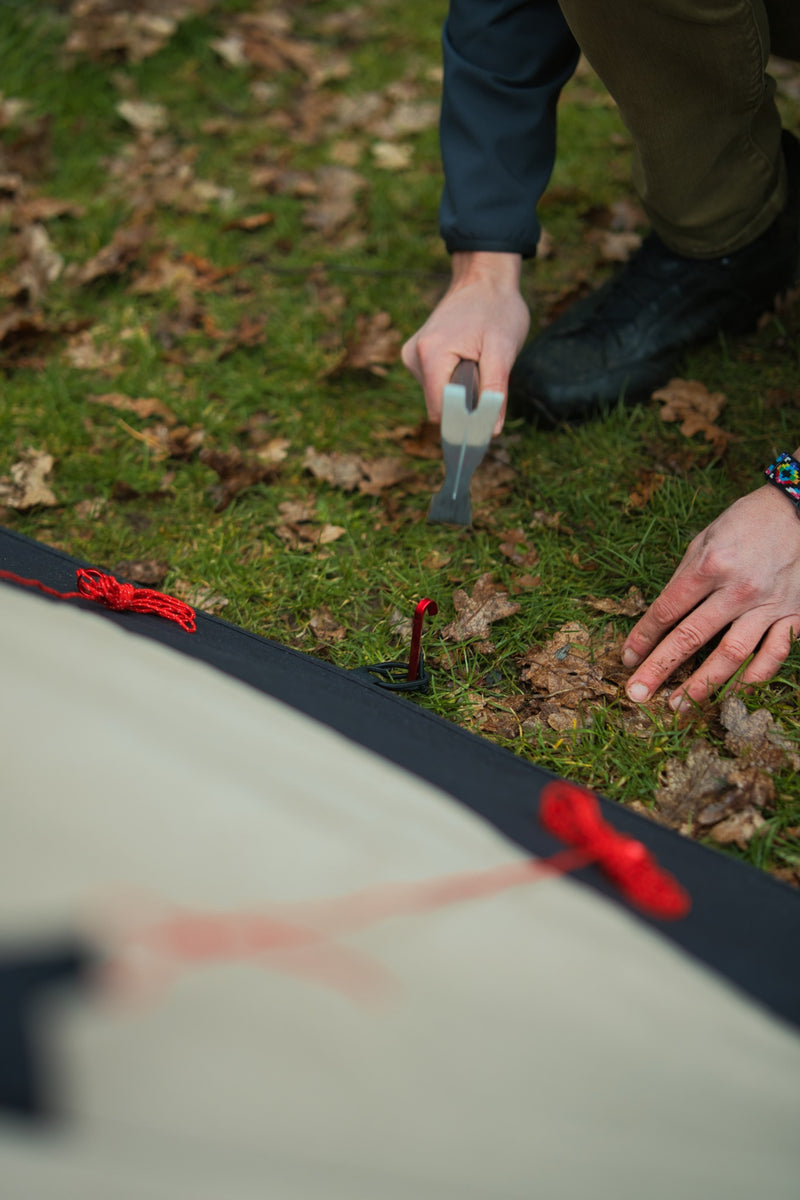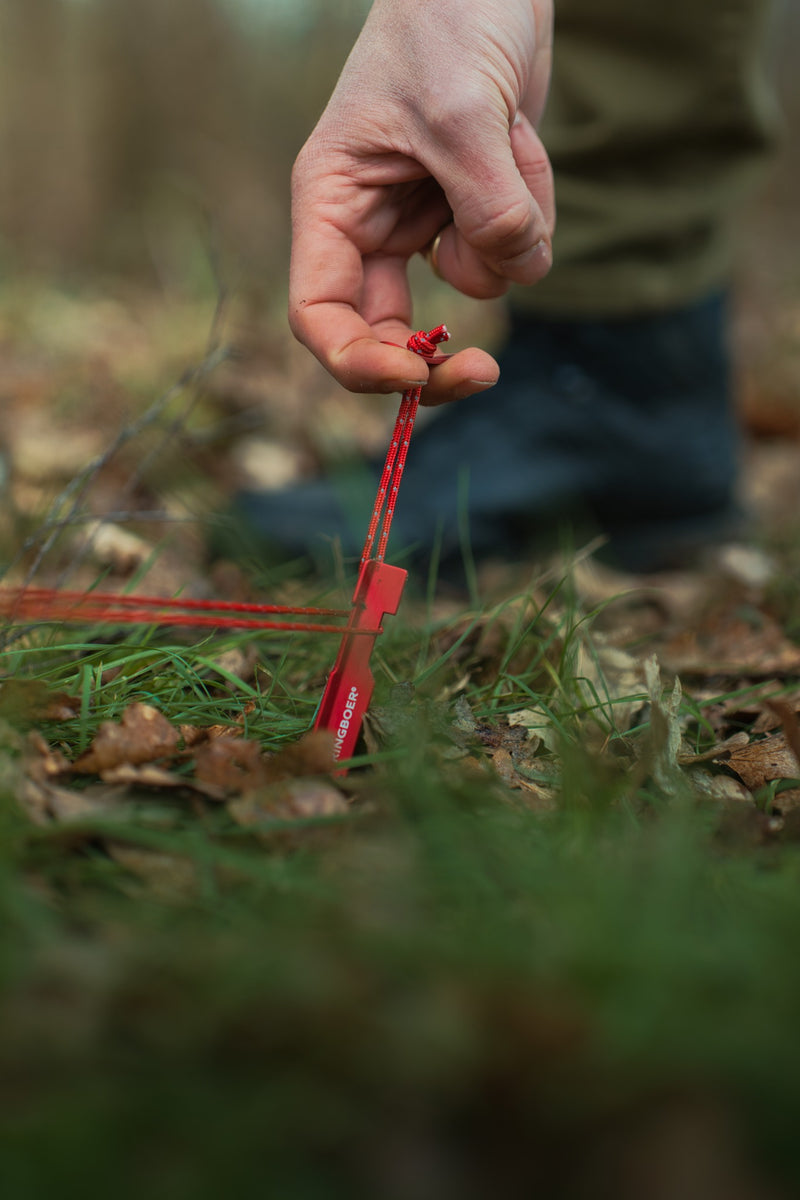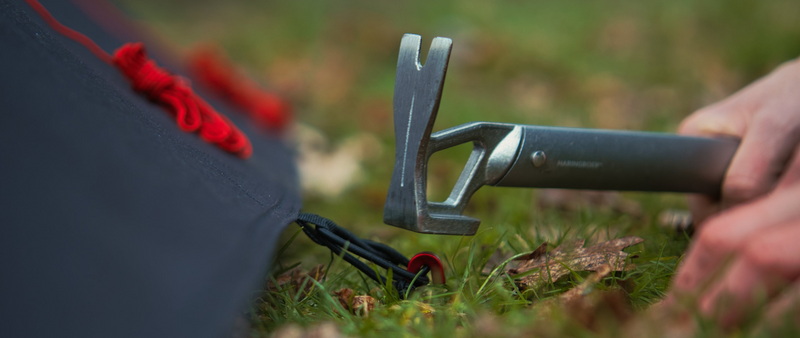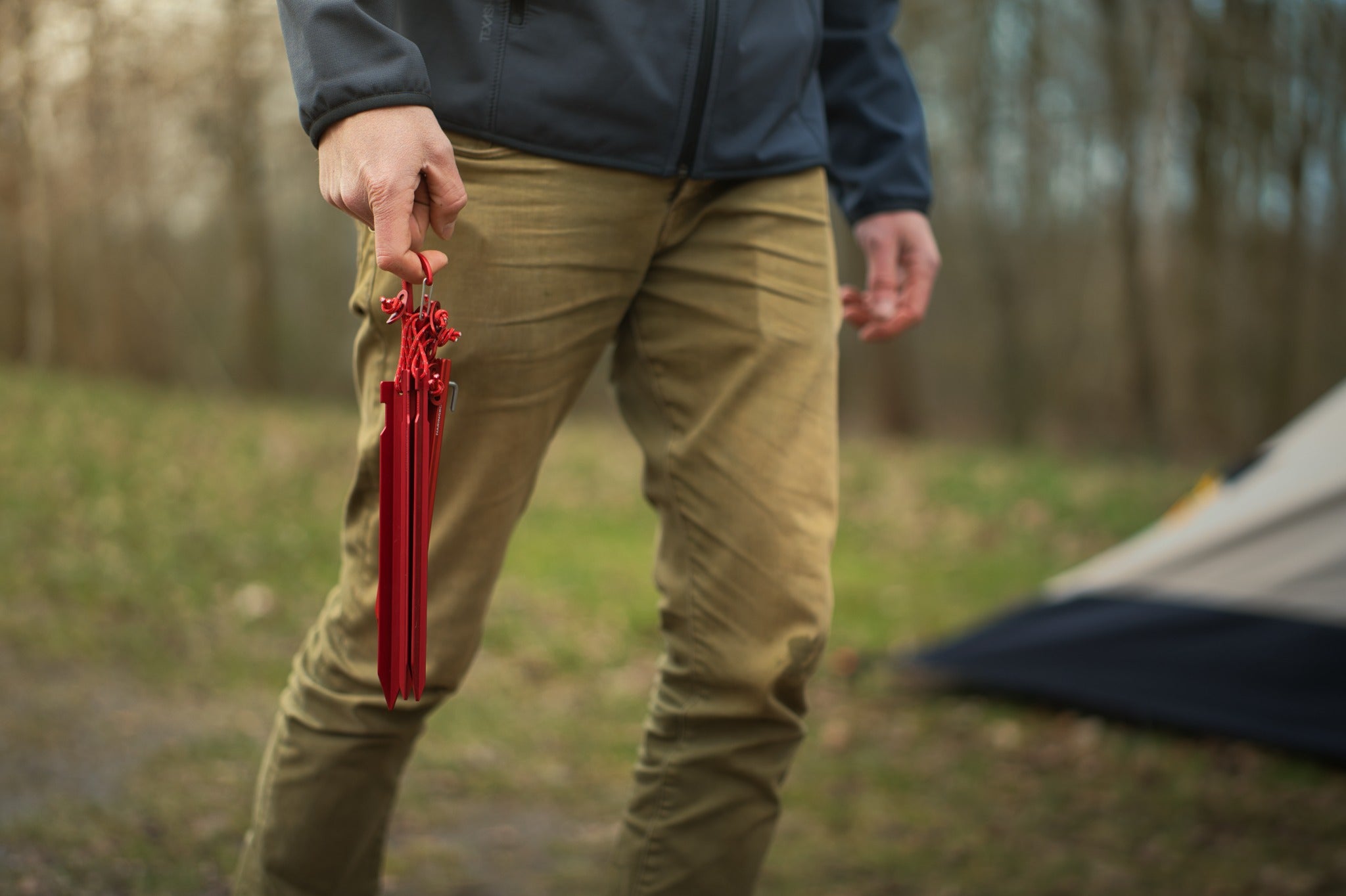
Strong & Lightweight Tent Pegs
Dein Zelt immer fest verankert. Leicht, stark und zuverlässig.
Entscheidungsstress?
Zweifelst du, welche Zeltheringe oder Zubehör am besten zu deinem Zelt und Untergrund passen?
Aluminium Zeltheringe
Die Alu-Heringe von Haringboer® werden alle aus Aluminium 7075-T6 gefertigt.
Schön, leicht, verschleißfest und superstark.
Immer komplett mit Karabiner, PegPull® & nachhaltigem Heringbeutel!
-
18 cm Aluminum Y-peg with PegPull®
12 pegs x 13 grams
Vendor:HaringboerRegular price €27Regular priceUnit price / per -
23 cm Aluminum Clay and Grass Herring with PegPull®
12 pegs x 34 grams
Vendor:HaringboerRegular price €29Regular priceUnit price / per -
26 cm Aluminum Rock Peg with PegPull®
12 pegs x 62 grams
Vendor:HaringboerRegular price €38Regular priceUnit price / per

Titanium Zeltheringe
Die Titan-Zeltheringe von Haringboer® bestehen aus TC4-Titan: stärker als Stahl und leichtgewichtig.
Für extreme Böden und maximale Sicherheit.
Immer komplett mit Karabiner, PegPull® & nachhaltigem Heringbeutel!
-
6" Titanium Rock Pin with PegPull®
8 pegs x 19 grams
Vendor:HaringboerRegular price €44Regular priceUnit price / per€0Sale price €44 -
16.5 cm Titanium V-Peg with PegPull®
8 pegs x 15 grams
Vendor:HaringboerRegular price €40Regular priceUnit price / per -
20cm Titanium Rock Pin with PegPull®
8 pegs x 38 grams
Vendor:HaringboerRegular price €49Regular priceUnit price / per

Haringboer Zubehör
Das Zubehör von Haringboer® ist dafür gemacht, deinen Campingtrip cleverer und einfacher zu gestalten.
Vom Hammer bis zur Abspannleine: robust, durchdacht und einsatzbereit.
Immer kompatibel mit meinen Heringen. Und immer solide. So, wie es sein soll.
-
4.0mm x 10m Guyline on Aluminum Spool
1 guyline on spool x 100 grams
Vendor:HaringboerRegular price €11Regular priceUnit price / per€15Sale price €11Sale -
60 x 35 mm Aluminium Carabiner
6 Carabiners
Vendor:HaringboerRegular price €12Regular priceUnit price / per -
Herring hammer 30 cm - Aluminum & stainless steel with carabiner
1 Peghammer x 420 grams
Vendor:HaringboerRegular price €25Regular priceUnit price / per
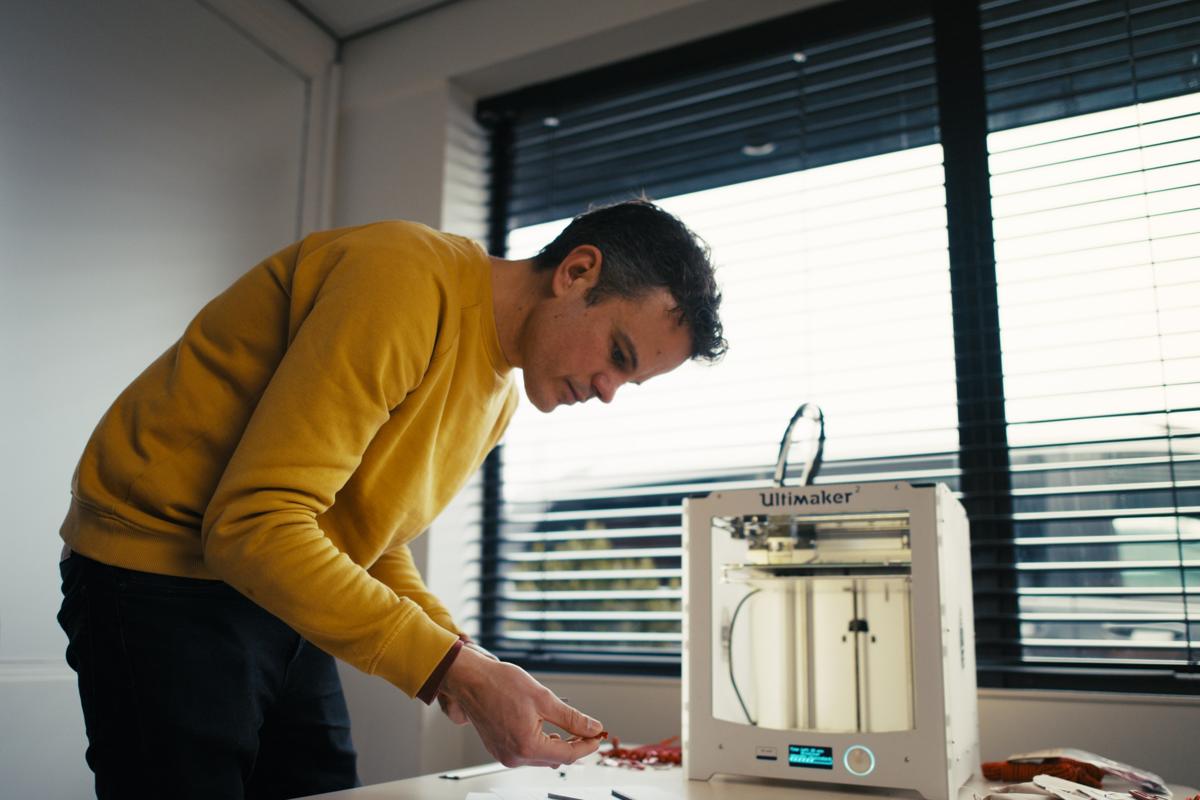
Vom Zelthering zum Komplettkonzept
Wie ich mit meiner Designerfahrung clevere Tools entwickle, um dein Zelt fest zu verankern.
-

Wie schön, Geschäfte zu machen‼️
Rezension lesenZuerst haben wir um Rat gefragt und bekamen eine außergewöhnlich begeisterte Antwort zurück...
-

Schön und stark
Rezension lesenSchönes Zeug, von einem Lieferanten, der wie ein begeisterter Material-Nerd wirkt. Immer wieder schön, wenn...
-

Schönes Produkt
Rezension lesenSchönes Produkt, schnelle Antworten auf Fragen und hervorragender Service
-

Sehr angenehm
Rezension lesenSehr angenehm, reagiert auch sehr schnell. Durch ein Problem bei PostNL waren meine Heringe noch nicht...
Blogs von Haringboer®
-
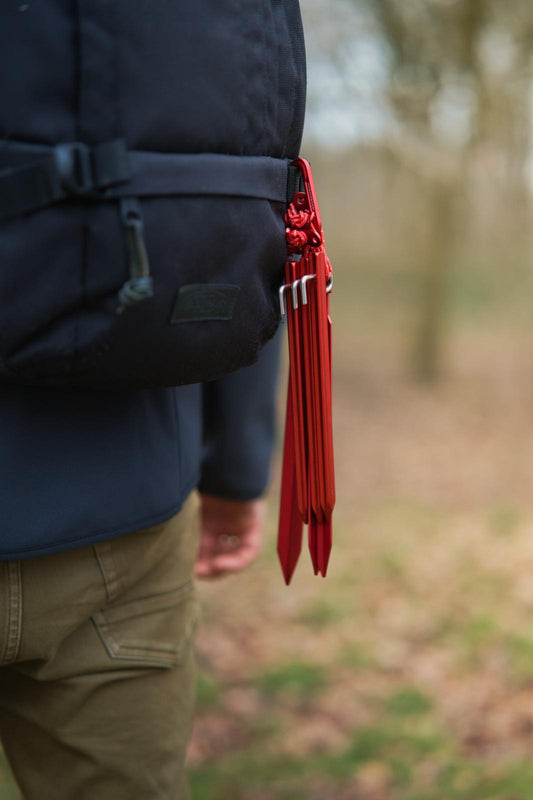
Wie wählst du den richtigen Zelthering für jede...
Als Camper willst du vor allem eines: sicher sein, dass dein Zelt fest steht, egal wie stark der Wind weht oder wie schwierig der Untergrund ist. Aber wie wählst du...
Wie wählst du den richtigen Zelthering für jede...
Als Camper willst du vor allem eines: sicher sein, dass dein Zelt fest steht, egal wie stark der Wind weht oder wie schwierig der Untergrund ist. Aber wie wählst du...
-

Narben deiner Abenteuer: beschädigte Zeltheringe
Deine beschädigten Zeltheringe sind deine Trophäen – der Beweis für all deine Erlebnisse. Jeder Kratzer erzählt eine Geschichte!
Narben deiner Abenteuer: beschädigte Zeltheringe
Deine beschädigten Zeltheringe sind deine Trophäen – der Beweis für all deine Erlebnisse. Jeder Kratzer erzählt eine Geschichte!
-

The Evolution of Tent Pegs: From Steel to Innov...
The world of tent pegs has come a long way, from heavy steel stakes to today’s ultralight, innovative designs. Let’s take a journey through history and discover how tent pegs...
The Evolution of Tent Pegs: From Steel to Innov...
The world of tent pegs has come a long way, from heavy steel stakes to today’s ultralight, innovative designs. Let’s take a journey through history and discover how tent pegs...
Frequently Asked Questions
What are the advantages of lightweight tent pegs?
Lightweight tent pegs reduce the overall weight of your camping gear, which is especially important for backpackers and hikers. By purchasing pegs made from high-quality materials like aluminum or titanium, you still get the strength you need.
How many tent pegs do I need for my tent?
The number of tent pegs you need depends on the size and design of your tent. Generally, you will need one peg for each corner of the tent and additional pegs for each guy line. Here are some guidelines:
- Small Tents: Typically require 6-8 pegs. This includes pegs for the four corners and 2-4 additional pegs for securing guy lines.
- Medium Tents: Usually need 10-12 pegs. This includes pegs for the corners, sides, and several guy lines.
- Large Tents: Often require 12-20 pegs. This includes pegs for all corners, multiple side points, and numerous guy lines to ensure stability.
- Special Conditions: For extreme weather or soft ground, consider carrying extra pegs to provide additional support.
Always check the manufacturer's recommendations for your specific tent model to ensure you have the right number of pegs for optimal stability.
How do I choose the right tent peg for my tent and ground type?
Choosing the right tent peg depends on the type of ground you'll be camping on. For very hard, rocky ground, slim titanium pegs are ideal. For soft or sandy soil, longer, broader aluminum pegs are best. Need help? Seek help on the Selection Guide page.
Are lightweight tent pegs durable enough for extreme weather conditions?
Yes, if lightweight tent pegs are made from durable materials like titanium or reinforced aluminum, these materials are highly resistant to bending and breaking, even under extreme conditions.
How can I prevent my tent pegs from breaking or bending?
Avoid hammering lightweight tent pegs with brute force. Gently tap the tent peg into the ground, and if you encounter resistance and the peg won't go further, move it a few centimeters and try again.
What are the best tent pegs for snow or soft ground?
For snow or soft ground, wide, long pegs with a large surface area are needed, such as our Sand and Snow stakes. These provide excellent grip and stability in loose soil.
How do I remove tent pegs without damaging them?
Use the pull cord and gently pull the tent pegs straight out of the ground. Avoid wrenching or pulling with brute force to prevent damage.
Are there tent pegs that don't rust?
Yes, tent pegs made from aluminum, titanium, or galvanized steel are rust-resistant and last longer, even in damp conditions. These materials also prevent rust stains on your tent fabric.
Die beste Lösung, um dein Zelt zu befestigen!
Need help choosing the perfect tent pegs for your next adventure?



